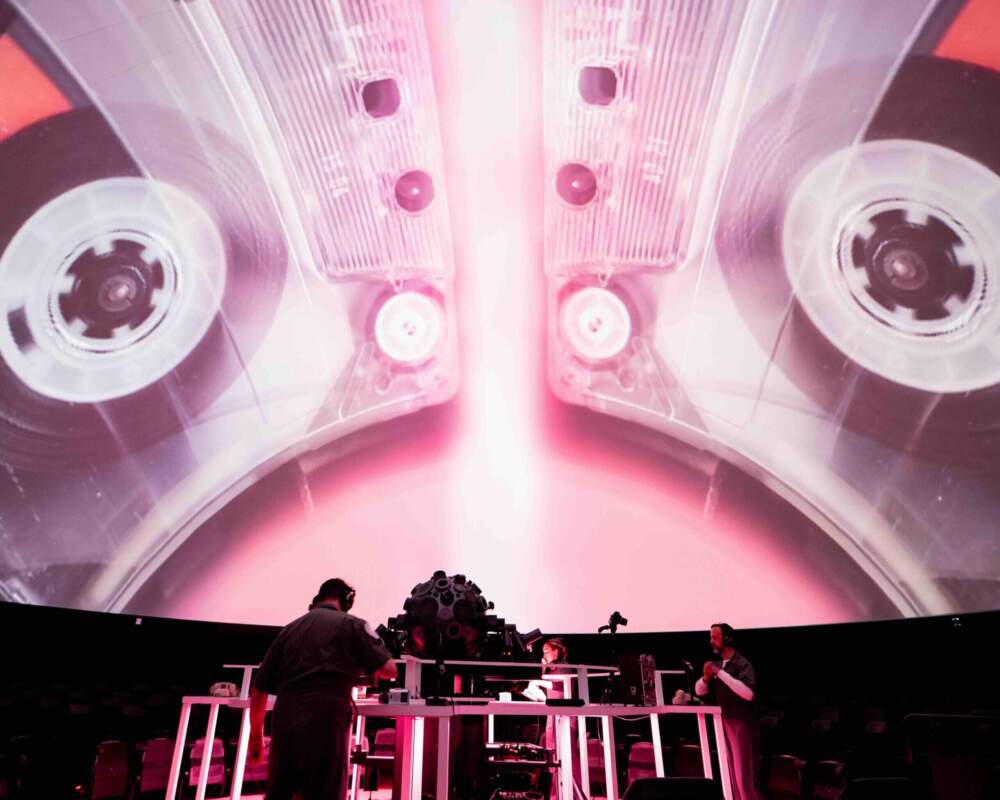Advertisement
Commentary
Finding escape — and connection — at the planetarium
Editor's Note: This story is an excerpt from WBUR's weekly arts and culture newsletter, The ARTery. If you like what you read and want it in your inbox, sign up here.
I love the dome of a planetarium.
Under that massive screen, I can escape this world and try another on for size. I marvel at how very small and held I feel in that place. The way the grandness of it all fully captures my attention and makes everything else fall away.
As a kid, I used to take out my miniature telescope and peer up at the universe, light pollution be damned. I always wondered if anyone was looking back at me. I still do.
This is one of the core questions behind the “Utopian Hotline,” which opened last week at the Museum of Science in partnership with ArtsEmerson, Octopus Theatricals and Theater Mitu out of Brooklyn (through May 18).
It began during the pandemic as a phone number on posters placed in cities across the country by Theater Mitu’s collaborators. The posters directed people to “call this number and tell us how you imagine a more perfect future.” The artists felt led to connect at a time of extreme isolation and despair. They worried hope was dissipating.
“And then people called, hundreds of people called,” said Rubén Polendo, founding artistic director of Theater Mitu. “They called and told stories, they sang to us, they put their kids on the phone, they prayed for us, they told us jokes… we started to come together as a group of artists and hearing these voicemails, and we realized that there is a lot of hope.”
This became, as Theater Mitu puts it, “a telephone hotline, a vinyl record, a performance.”
Advertisement

I walked into the Charles Hayden Planetarium and the 57-foot dome was softly lit and there was a pink carpet on the floor. Each person was wearing a set of headphones. It felt like a silent disco.
We learned about NASA’s 1977 Voyager Golden Record, which inspired the show creators. Today, the record floats somewhere in the vacuum of space, approximately 15 billion miles from Earth, attached to Voyager probes 1 and 2.
They are the first human-made objects to go interstellar and were described by Carl Sagan as messages in a bottle launched into the “cosmic ocean” for any spacefarers who might discover them. On the records are greetings in 55 languages, human sounds of laughter, nature and music. Animal calls and weather patterns alongside more than 100 images of humanity and our discoveries.
Much like the record, “Utopian Hotline” shares recordings of songs, hopes for humankind and musings on loneliness, family and grief. We hear a kid say, “The future is now,” reminding those in the room that there is no difference between the present or the past.
We are shaping the future as we live. Hope and the future are community actions, Polendo said. No matter how much we try, we can’t build what’s coming separately.
As we sat in those chairs, guides in the room told us to think about the others sitting nearby. To imagine what they ate for breakfast, the shape of the path they walk when they’re pacing, or the weight of the last thing they grabbed at the grocery store, placed in their cart and then didn’t buy.
I felt like people looked at each other differently as we left the room. Some lingered to process with others, sharing what they experienced. Some stayed for the second show.
Each of us taking stock of our own golden records, searching for contact. Rather than a life form from outer space, perhaps we learned about the person seated next to us.
Theater Mitu is still accepting anonymous messages for the future. To leave your own, dial the hotline at 1-646-694-8050 and respond to the prompt.
